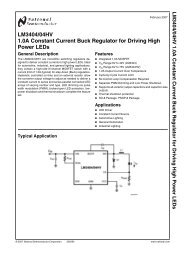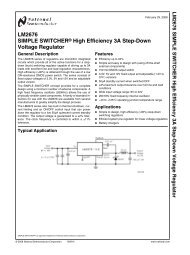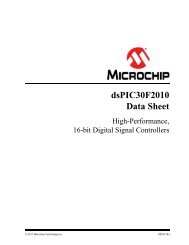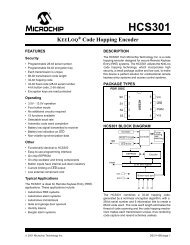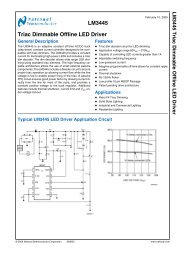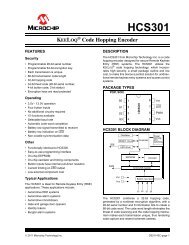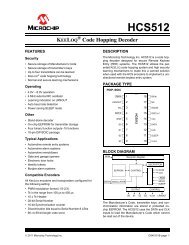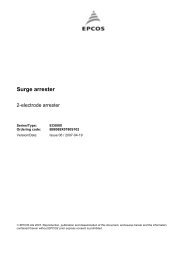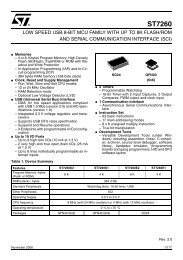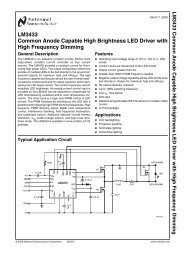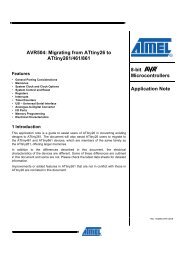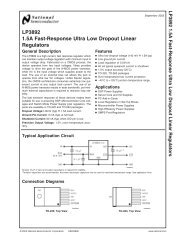You also want an ePaper? Increase the reach of your titles
YUMPU automatically turns print PDFs into web optimized ePapers that Google loves.
General-purpose timers<br />
<strong>STM32W108C8</strong><br />
Bit 14 TIM_ECE: External Clock Enable<br />
This bit enables external clock mode 2.<br />
0: External clock mode 2 disabled.<br />
1: External clock mode 2 enabled. The counter is clocked by any active edge on the ETRF<br />
signal.<br />
Note: Setting the TIM_ECE bit has the same effect as selecting external clock mode 1 with<br />
TRGI connected to ETRF (TIM_SMS=111 and TIM_TS=111).<br />
It is possible to use this mode simultaneously with the following slave modes: reset<br />
mode, gated mode and trigger mode. TRGI must not be connected to ETRF in this case<br />
(the TIM_TS bits must not be 111).<br />
If external clock mode 1 and external clock mode 2 are enabled at the same time, the<br />
external clock input will be ETRF.<br />
Bits [13:12] TIM_ETPS: External Trigger Prescaler<br />
External trigger signal ETRP frequency must be at most 1/4 of CK frequency. A prescaler can<br />
be enabled to reduce ETRP frequency. It is useful with fast external clocks.<br />
00: ETRP prescaler off.<br />
01: Divide ETRP frequency by 2.<br />
10: Divide ETRP frequency by 4.<br />
11: Divide ETRP frequency by 8.<br />
Bits [11:8] TIM_ETF: External Trigger Filter<br />
This defines the frequency used to sample the ETRP signal, f Sampling , and the length of the<br />
digital filter applied to ETRP. The digital filter is made of an event counter in which N events are<br />
needed to validate a transition on the output:<br />
0000: f Sampling = PCLK, no filtering. 1111: f Sampling = PCLK/32, N=8.<br />
0001: f Sampling = PCLK, N=2. 1110: f Sampling = PCLK/32, N=6.<br />
0010: f Sampling = PCLK, N=4. 1101: f Sampling = PCLK/32, N=5.<br />
0011: f Sampling = PCLK, N=8. 1100: f Sampling = PCLK/16, N=8.<br />
0100: f Sampling = PCLK/2, N=6. 1011: f Sampling = PCLK/16, N=6.<br />
0101: f Sampling = PCLK/2, N=8. 1010: f Sampling = PCLK/16, N=5.<br />
0110: f Sampling = PCLK/4, N=6. 1001: f Sampling = PCLK/8, N=8.<br />
0111: f Sampling = PCLK/4, N=8. 1000: f Sampling = PCLK/8, N=6.<br />
Note: PCLK is 12 MHz when the <strong>STM32W108C8</strong> is using the 24 MHz crystal oscillator, and 6<br />
MHz if using the 12 MHz RC oscillator.<br />
Bit 7 TIM_MSM: Master/Slave Mode<br />
0: No action.<br />
1: The effect of an event on the trigger input (TRGI) is delayed to allow exact synchronization<br />
between the current timer and the slave (through TRGO). It is useful for synchronizing timers<br />
on a single external event.<br />
Bits [6:4] TIM_TS: Trigger Selection<br />
This bit field selects the trigger input used to synchronize the counter.<br />
000 : Internal Trigger 0 (ITR0).<br />
100 : TI1 Edge Detector (TI1F_ED).<br />
101 : Filtered Timer Input 1 (TI1FP1).<br />
110 : Filtered Timer Input 2 (TI2FP2).<br />
111 : External Trigger input (ETRF).<br />
Note: These bits must be changed only when they are not used (when TIM_SMS=000) to<br />
avoid detecting spurious edges during the transition.<br />
145/215 Doc ID 018587 Rev 2




